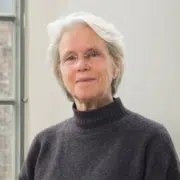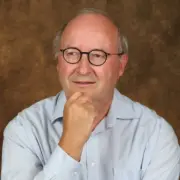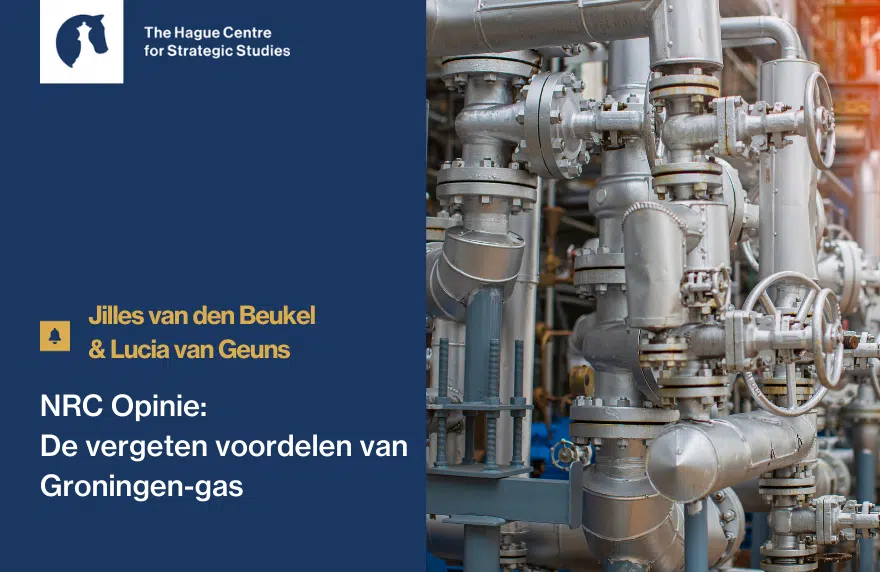“The green generation before us still thinks we are the centre of the world. Forget it. We’re becoming an afterthought,” warns Energy Analyst Jilles van den Beukel. Together with Energy Expert Lucia van Geuns he wrote a report on oil and gas in the energy transition. For Shell Venster, Monika Jak spoke at length with both Dutch analysts, affiliated with thinktank The Hague Centre for Strategic Studies (HCSS), about the need for a broader view of the energy world, where powers are shifting.
The targets are set and neatly laid out on paper. Whether the energy transition as such is needed, is no longer questioned. What will the post-fossil energy system look like? The key answer to that is of particular interest to Europe, including the Netherlands, where some 80 percent of the current energy system is still based on fossil fuels.
At a time when almost all attention is focused on the new energy system, Van Geuns and Van den Beukel, thought the fossil fuel question was too important to leave unanswered. In November last year they published their study “Oil and gas during the energy transition” (Dutch only).
Source: Monika Jak, Shell Venster, July 2024
A world with power blocs
Van den Beukel characterizes the reason for the study: “We come from the calm period of 1990 to 2020. The Cold War was over, global oil and gas markets were functioning well, and there was a fair amount of international cooperation. Now we suddenly wake up in an unpleasant world, with tensions everywhere. With multiple wars taking place at the same time, tensions between the United States and China, a Global South* that is emerging and does not always look at the Western world with friendly eyes. A world with more competition and power blocs. Meanwhile, climate change is gradually becoming more painful. There will be tedious tipping points. People prefer to close their eyes to that. Just as we as a society have closed our eyes to climate change for decades.”
Van Geuns adds: “China and the United States are virtually self-sufficient in energy. Europe still consumes a lot of oil and gas, but produces only about 5 percent of the oil and 10 percent of the gas it needs. For electricity, there is solar, wind, hydropower and, in time, perhaps also more nuclear power as a substitute. For oil, especially for parts of the transport sector and parts of the petrochemical sector, there are no large-scale substitutes yet. Europe is vulnerable in today’s bleak geopolitical climate.”
How governments deal with it
They initiated the study on their own initiative. The experts mainly wanted to dive into the matter because they were curious about the impact of the energy transition on the fossil fuel market, how different regions and governments deal with it and what it means for companies such as Shell, but also for state oil companies, for example.
“Knowledge of the fossil world and fossil markets in the Netherlands is diminishing,” says Van den Beukel. “Actually, society doesn’t want to have anything to do with it anymore, because it wants to get rid of fossil fuels. The point is that, for the time being, we are still dependent on them.”
Lack of understanding can have major consequences
Not understanding the fossil fuels world, can have major consequences, Van den Beukel says. “A few years ago, even before the invasion of Ukraine by Russia, people at the “Netherlands Ministry of Economic Affairs and Climate Policy” were still claiming that the possible loss of Russian gas would not be such a problem. Notice that there is quite a need for a broader context.”
A few months after the Russian invasion, in June 2022, Van Geuns and Van den Beukel were both among experts invited to talk about solutions to the energy crisis with the cabinet ministers at the time: Rob Jetten (Climate and Energy), Micky Adriaansens (Economic Affairs and Climate) and State Secretary Hans Vijlbrief (Mining, Groningen). Van den Beukel advised the ministers to keep the Netherlands’ coal-fired power stations open. And that’s exactly what happened. In Dutch government circles, the expertise of both analysts, and their influence, is a welcome by-product of their innate curiosity.
European oil and gas companies are facing risks
The energy transition entails major uncertainties, mainly due to geopolitical tensions and the speed of the transition, the specialists explain in their report. Global investment in the oil and gas industry is falling. European oil and gas companies are facing risks and an uncertain future. The authors do not make predictions about the future fossil fuel markets, but according to Van den Beukel and Van Geuns, all likely scenarios for the energy transition include volatility.
Van den Beukel believes European international oil companies (IOCs) face challenges. “The new energy system is insufficiently profitable. The return on investment in renewable energy sources is around 5 to 10 percent, for projects in oil and gas it is around 20 percent. Investors are fine with a little difference, but it shouldn’t be too much. American IOCs are less affected by this because the need for a rapid transition is felt less there and they are less active in the new energy system.”
European IOCs have a lower price-to-earnings ratio than their US competitors. That makes them vulnerable to takeovers, the energy experts say. “That is a real risk for companies such as Shell and BP,” says Van den Beukel. “They are typically acquired by consortiums of hedge funds that then break up a company and sell it in parts. This does not apply to largely or completely state-owned companies such as Equinor from Norway.”
Shift to national oil companies
As Europe remains dependent on oil and gas for decades to come, Southwest Asia will only become more important, the experts feel. Oil production, reserves and capital will likely shift even more to the national oil companies (NOCs) that are already dominant in this region. Van Geuns explains:”The NOCs in the Middle East are not open for customers to shout loudly that they are in the energy transition and that they will no longer need their products. At the moment, they prefer to serve a more reliable, long-term customer like China.”
Van Geuns says it is ironic that large institutional investors are shying away from oil and gas, especially in Europe. “Fossil fuel companies are simply not loved, despite the fact that everyone uses the products they generate. Few people know, for example, that a large part of the liquefied natural gas (LNG) that provided relief during the energy crisis in 2022 was transported to Europe by Shell.”
“I think it’s a shame that European society can’t deal more pragmatically with the European IOCs,” says Van den Beukel. “That they understand that their manoeuvrability is limited.” He says applause is not needed, but compared to their peers in other parts of the world, European IOCs are still trying to meet societies’ demands. “At the very least, one should acknowledge that.”
Fight the battle on the demand side
Are there any possible solutions for the future? Van Geuns says it is about having vision and choosing a clear direction. China has them, Europe lacks them, she says. “What to do with energy-intensive industry in the longer term you can’t just leave to the market. You’ll need industrial policy making.” Van den Beukel: “And you have to fight the battle against fossil fuels on the demand side. Make CO2 pricing more expensive, reduce emission rights. That works better for us structurally as a society, than making it difficult on the supply side, especially for European companies. We already have so little oil and gas production.”
Both believe that clear choices need to be made. What do you want to keep? What is important for the economy? What is important for security? Van den Beukel: “And then make that choice! Because if you don’t, a lot of (the industry) will probably go away. Especially parts of the energy-intensive industry.”
Van Geuns: “We all agree on the end goals. But the next ten, fifteen years will be bumpy. This is mainly due to the geopolitical climate and the vulnerability that we have in Europe and the Netherlands in the field of energy. When it comes to critical materials, which are important for sustainable technologies, we are also becoming increasingly dependent on China, for example. This fragmented world makes the future more unpredictable. Europe should behave more strategically and autonomously.”
Europe needs to grow up
Van den Beukel says Europe needs to grow up and start pulling up its socks, stop outsourcing everything. He points at China and India, that together have almost 2.9 billion people, compared to less than 450 million in the European Union. “And one day, Sub-Saharan Africa is coming.” Power is shifting, according to the two experts. Van Geuns: “But all those countries are relative newcomers. We have been emitting greenhouse gases for 150 years. Let’s set a good example with the energy transition in Europe and the Netherlands.”
Source: Shell Venster, 25 July 2024
This is an adapted English version of the original Dutch interview.
* The Global South refers to the countries and regions in Africa, Latin America and the Caribbean, Asia without the industrialized countries like Japan and South Korea, and Oceania minus Australia and New Zealand. (United Nations Conference on Trade and Development (UNCTAD))








